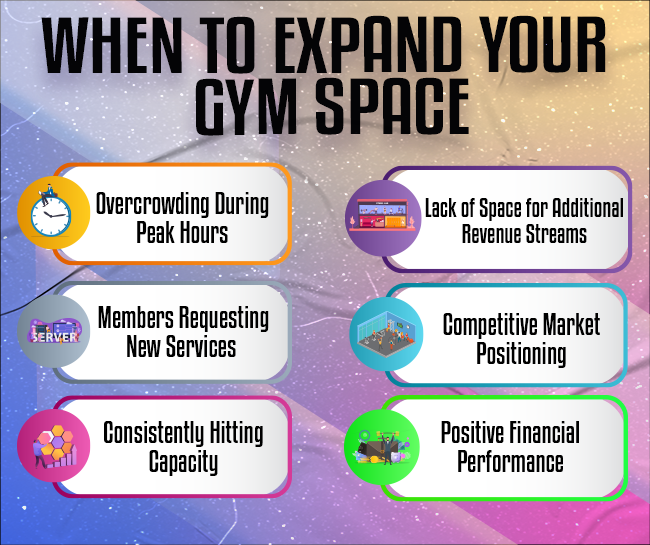
When a gym thrives, expanding becomes more than a dream—it becomes a necessity. As a gym owner or manager, you might find yourself on the brink of needing more space, new services, or even an entirely new location. This comprehensive guide aims to take you through the journey of gym expansion, sharing expert insights, success strategies, and potential pitfalls to watch out for.
When You Should Consider Expanding Your Gym Space

Expansion isn’t a decision to be taken lightly, and recognizing the right time to grow is crucial. Here are signs that indicate the only viable option for your gym’s success is to expand:
- Overcrowding During Peak Hours: If your gym consistently sees long lines for equipment and overcrowded classes, despite efforts to manage scheduling, it’s a clear sign that you’re outgrowing your current space.
- Members Requesting New Services: If a growing number of members are asking for services, classes, or equipment you can’t provide due to space limitations, expanding is the way to meet their needs and keep them satisfied.
- Consistently Hitting Capacity: If your gym is operating at or near full capacity most of the time, expansion isn’t just an option; it’s a necessity to continue growing and avoid turning away potential new members.
- Lack of Space for Additional Revenue Streams: Want to diversify your revenue through new services but are restricted by current space constraints? The expansion allows for the addition of new revenue streams like specialized classes, personal training, or even a cafe.
- Competitive Market Positioning: If you’re in a competitive market and your gym’s limitations are causing you to lose members to competitors with larger or more modern facilities, expansion can reinforce your market position.
- Positive Financial Performance: Strong and consistent revenue growth, along with healthy profit margins, can be an indication that your business is ready for expansion. Financial stability is key to taking on the risks associated with growing your space.
💡 These reasons highlight the critical junctures in your gym’s lifecycle where expansion is not just a possibility but a strategic necessity. Recognizing these signs and acting on them in a timely manner can set the stage for continued success and growth.
The Potential Pitfalls of Expanding Your Business
- Financial Risks:

Expansion brings significant costs. To combat this, ensure thorough financial projections and budgeting, and perhaps consider phased growth to spread the financial burden. Engage financial experts to guide your decisions and ensure that you have sufficient reserves or access to funding.
- Over-Expansion:

Growing too quickly can lead to problems. To mitigate this, plan a controlled, staged expansion. Constantly monitor the impact on resources and quality of service, and be prepared to adjust your plans as needed to maintain standards.
- Market Saturation:

Expanding in an already crowded market is risky. Research to identify underserved areas or niches and focus on what sets your gym apart. By understanding the local market’s needs and aligning your offerings, you can carve out your space.
- Loss of Focus on Existing Business:

Expansion can divert focus from your core business. To prevent dissatisfaction among current members and staff, assign dedicated teams to manage the expansion and maintain a strong focus on your existing operations.
- Regulatory and Compliance Challenges:

Different locations bring new legal requirements. Engage local experts early in the planning stage to understand and comply with all regulations. Regular compliance audits can also help in avoiding legal complications.
- Cultural Misalignment:

Culture varies by location. To bridge any gap, engage with the local community to understand their needs and preferences. Tailor your offerings to match local expectations and involve local influencers or staff to help in aligning with the community.
- Poorly Executed Marketing and Launch:

Marketing is key to a successful expansion. Collaborate with marketing experts to create targeted campaigns that resonate with the local audience. A soft launch with special offers for early members can build momentum.
- Inefficient Utilization of New Space:

A poorly planned layout can lead to inefficient use. To optimize space, consider the flow of foot traffic, the types of workouts your members prefer, and create designated areas for different activities. Engage a commercial gym designer if necessary to make the most of your space.
💡 By approaching these pitfalls with awareness and strategic planning, you can not only navigate the complexities of expanding your gym business but turn them into opportunities for growth and success. Combining expert advice, careful planning, and responsiveness to changing conditions will empower you to expand confidently and effectively.
A Proven Guide to Opening a New Location

Location Scouting:
Identifying your target market is vital as it helps you understand the demographics and psychographics of your potential audience. Competitor analysis will reveal gaps in existing offerings, and you should also look for locations with easy access and high visibility. Don’t forget to verify zoning laws and local regulations.
Budgeting and Funding:
Detailed financial planning encompasses all initial and ongoing costs. Explore different funding avenues, such as bank loans or crowdfunding, and make sure to set aside a contingency fund for unexpected expenses.
Design and Layout:
Consider the member’s experience in your design and create a comfortable flow between workout areas. Efficient space utilization is key, and engaging professionals in gym design could be beneficial.
Hiring and Training Staff:
Hiring local talent and implementing training programs that align with your gym’s ethos and standards will enhance your connection with the community.
Marketing and Launch:
Pre-launch marketing can include social media teasers or local partnerships, leading to a soft launch with exclusive access for early members. Your grand opening should be an event that reflects your brand.
Ongoing Management and Growth Strategies:
Monitor member feedback, host community events, and experiment with different membership tiers. These strategies keep the gym environment dynamic and responsive to members’ needs.
Technology Implementation:
Use software for membership management and reporting. Security systems and an active online presence, including a functional website and engaging social media, can further streamline operations.
💡 Utilize Spark Membership software for efficient membership management, reporting, and bolster operations with robust security systems and a vibrant online presence, including a dynamic website and engaging social media channels.
By considering each stage in the process of opening a new location, you’ll ensure a smooth transition from concept to successful operation. This guide reflects the accumulated wisdom of successful gym owners, offering you a roadmap to growth and success, all while fostering a community of satisfied, loyal members.
Ready to take your gym’s identity to the next level? Dive into our latest blog: “Building A Reputable Gym Identity With Fitness Branding.” Discover the essential steps to create a powerful brand that resonates with your audience.